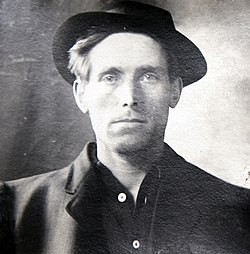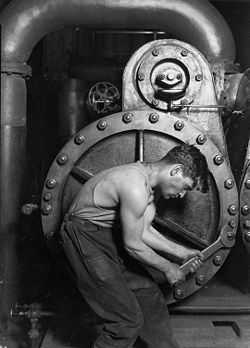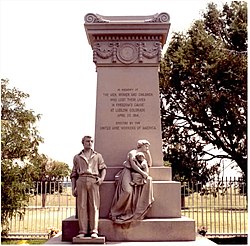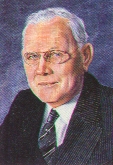
- In trade unions, workers campaign for higher wages, better working conditions and fair treatment from their employers, and through the implementation of labour laws, from their governments. They do this through collective bargaining, sectoral bargaining, and when needed, strike action. In some countries, co-determination gives representatives of workers seats on the board of directors of their employers.
- Political parties representing the interests of workers campaign for labour rights, social security and the welfare state. They are usually called a labour party (in English-speaking countries), a social democratic party (in Germanic and Slavic countries), a socialist party (in Romance countries), or sometimes a workers' party.
- Though historically less prominent, the cooperative movement campaigns to replace capitalist ownership of the economy with worker cooperatives, consumer cooperatives, and other types of cooperative ownership. This is related to the concept of economic democracy.
The labour movement developed as a response to capitalism and the Industrial Revolution of the late 18th and early 19th centuries, at about the same time as socialism. The early goals of the movement were the right to unionise, the right to vote, democracy, safe working conditions and the 40-hour week. As these were achieved in many of the advanced economies of western Europe and north America in the early decades of the 20th century, the labour movement expanded to issues of welfare and social insurance, wealth distribution and income distribution, public services like health care and education, social housing and common ownership. (Full article...)
The American Federation of Labor and Congress of Industrial Organizations (AFL-CIO) is a national trade union center that is the largest federation of unions in the United States. It is made up of 61 national and international unions, together representing nearly 15 million active and retired workers. The AFL-CIO engages in substantial political spending and activism, typically in support of progressive and pro-labor policies.
The AFL-CIO was formed in 1955 when the American Federation of Labor and the Congress of Industrial Organizations merged after a long estrangement. Union membership in the US peaked in 1979, when the AFL-CIO's affiliated unions had nearly twenty million members. From 1955 until 2005, the AFL-CIO's member unions represented nearly all unionized workers in the United States. Several large unions split away from AFL-CIO and formed the rival Change to Win Federation in 2005, although a number of those unions have since re-affiliated, and many locals of Change to Win are either part of or work with their local central labor councils. The largest unions currently in the AFL-CIO are the Service Employees International Union (SEIU), with 2 million members, American Federation of Teachers (AFT) with approximately 1.7 million members, American Federation of State, County and Municipal Employees (AFSCME), with approximately 1.4 million members, and United Food and Commercial Workers with 1.2 million members. (Full article...)
Significant dates in labour history.
- April 01 - Burston Strike School began in 1914 the U.K.; the 1972 Major League Baseball strike began in the U.S. and Canada; the 1980 New York City transit strike began; the U.S. Supreme Court decided NLRB v. Truck Drivers Local 449; the Federation of Unions of South Africa was founded; the Allied Pilots Association was founded; the Loray Mill strike began in the U.S. in 1929; Sol Chick Chaikin died
- April 02 - Weldon Mathis was born; Eugene Hanley was born; the 1994–95 Major League Baseball strike ended in 1995
- April 03 - Percy Wells died
- April 04 - The On-to-Ottawa Trek began in Canada in 1935; William Quesse was born; the 2006 Minor League Baseball umpire strike began in the U.S.
- April 06 - Rose Schneiderman was born; the 1905 Chicago Teamsters' strike began as the Teamsters engaged in a sympathy strike; B. T. Ranadive died
- April 07 - The U.S. Supreme Court decided Lochner v. New York; Basawon Singh (Sinha) died
- April 08 - The 1998 Australian waterfront dispute began
- April 09 - John H. Dent died; the U.S. Supreme Court decided Adkins v. Children's Hospital and Bunting v. Oregon; Chris Watson was born; President Harry S. Truman nationalizes all steel mills in anticipation of the 1952 steel strike; Natascha Engel was born; Thomas Jackson was born
- April 10 - Harold J. Gibbons was born; Dolores Huerta was born; Joseph Diescho was born; George Lippard was born; Edward J. Carlough was born; Lee Batchelor was born; Anna Walentynowicz died
- April 11 - The 1980 New York City transit strike ended
- April 12 - Tom Addison was born; the U.S. Supreme Court decided NLRB v. Jones & Laughlin Steel Corp.; the Auto-Lite strike began in 1934 in the U.S.; the Union Label Department, AFL–CIO was founded; the Memphis sanitation strike ended; the Queensland Council of Unions was founded; the Sons of Vulcan was founded
- April 13 - Henk Sneevliet died; the Laborers' International Union of North America was founded
- April 14 - Dorothy Jacobs Bellanca was born; Marvin Miller was born; Ernest Bevin died
- April 15 - A. Philip Randolph was born; Pablo Manlapit died; the American Federation of Teachers was founded; "Black Friday" occurred in 1921 in the U.K.; Aleksei Gastev died; the Trade Unions Forum was founded; Margaretta Scott was born
- April 16 - Joseph Havelock Wilson died
- April 17 - Manwel Dimech died
- April 18 - Joseph Labadie was born; R. J. Thomas died
- April 20 - Gro Harlem Brundtland was born; The Ludlow Massacre occurred in 1914 in the U.S.; the International Harvester strike of 1979–80 ended
- April 21 - The Bituminous coal miners' strike of 1894 began in the U.S.; the First Employment Contract is repealed in France in 2006
- April 22 - Frederick Nicholas Zihlman died
- April 23 - Russell Crowell was born; the Canadian Labour Congress was formed; Cesar Chavez died; the Hock Lee bus riots occurred in 1955 in Singapore; Edward Lamb was born
- April 25 - Arnold Miller was born
- April 26 - United Trade Union Centre (Lanin Sarani) was founded
- April 28 - Workers' Memorial Day; Roy Lee Williams died; Bob White was born; Greg Combet was born; Jerry Horan died; Joseph Glimco died
- April 29 - The Coeur d'Alene miners' dispute of 1899 occurred in the U.S.
- ... that up to 129,000 Canadian federal workers went on strike?
- ... that Sting wrote "We Work the Black Seam" because he felt that "the case for coal was never put to the nation" during the 1984–85 British miners' strike, which began 40 years ago today?
- ... that after being arrested for organizing a general strike in 1920, S. Girinis was sent to the Soviet Union following a Soviet-Lithuanian exchange of political prisoners?
- ... that members of the Trade Union Opposition Federation stormed the Copenhagen Stock Exchange?
- ... that labor lawyer Dick Moss argued the 1975 case which resulted in the establishment of free agency in Major League Baseball?
- ... that Scottish bricklayer Brian Higgins was unable to find work for 25 years after appearing on a construction-industry blacklist?
- "Had the employers of past generations all of them dealt fairly with their men there would have been no unions."
|
— Stanley Baldwin |
- ...that the steel strike of 1959 led to significant importation of foreign steel for the first time in United States history?
- ...that noted labor historian Selig Perlman is the uncle of author Judith Martin, better known as "Miss Manners"?
- ...that Anna Walentynowicz and Alina Pienkowska transformed a strike over bread and butter issues into a solidarity strike in sympathy with other striking establishments giving birth to Solidarity in 1980?
Also see our sister WikiProject, Housing and Tenant Rights!
The following Wikimedia Foundation sister projects provide more on this subject:
-
Commons
Free media repository -
Wikibooks
Free textbooks and manuals -
Wikidata
Free knowledge base -
Wikinews
Free-content news -
Wikiquote
Collection of quotations -
Wikisource
Free-content library -
Wikiversity
Free learning tools -
Wiktionary
Dictionary and thesaurus














































































